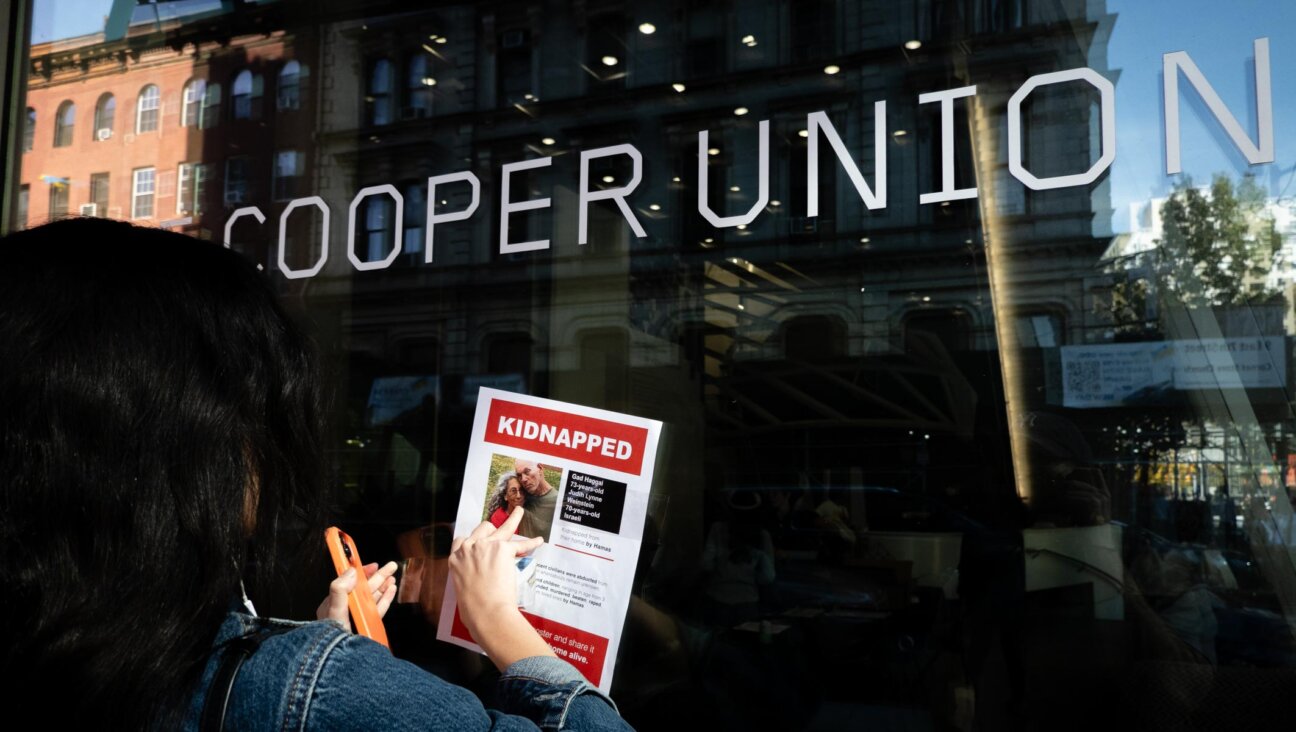McCain Touts Stance on Israel
John Mc Cain prides himself on being a straight shooter, a political maverick who speaks his mind even when it riles his own camp or alarms voters.
He supported President Bush’s troop surge in Iraq even though pundits called it political suicide. He once told a questioner that it “would be fine with me” if America kept a military presence there for 100 years.
Asked last year about Iran’s nuclear ambitions, he jokingly sang the words “Bomb, bomb, bomb. Bomb, bomb Iran” to the tune of the Beach Boys hit “Barbara Ann” — this despite the opposition of most Americans to another Middle East war and growing Democratic support for engagement with the mullahs.
On Israel, however, McCain has been uncharacteristically conventional. He offers unqualified support, expressed in years of public statements. He has the endorsement of pro-Israel icon Joseph Lieberman, the independent senator from Connecticut, and of former New York mayor Rudolph Giuliani, the favorite among Jewish Republicans until he quit the race last month.
Along with using his national security credentials to gain advantage over his putative Democratic opponent, McCain touts his support for Israel as a way to soothe the restive Republican right. Conservatives have attacked the Arizona senator bitterly for his positions on same-sex marriage, taxes, immigration and campaign-financing. Hence the lengths to which McCain has gone to quash any notion that he might ask Israel to make concessions.
Nearly two years ago, a Ha’aretz reporter wrote that he had asked McCain if resolving the Israeli-Palestinian issue would require movement toward the 1967 armistice lines with minor territorial modifications, and McCain had nodded in the affirmative. The senator had added that if elected president, he would ask both sides to make sacrifices and would send “the smartest guy I know” to the Middle East. That person could be the elder George Bush’s national security adviser, Brent Scowcroft, or his secretary of state, James Baker, “though I know that you in Israel don’t like Baker.”
The comments were vintage McCain: a provocative expression of a fairly standard American policy. More surprising was what happened afterward. Coming under fire from some hawkish American Jews, McCain retreated.
A few days after the Ha’aretz article appeared, McCain was blasted in the hawkish Jewish Press of New York. The Orthodox-oriented weekly described his statements as “jarring” because they “reflect the view … championed by the State Department and both the moderate and liberal wings of the Democratic party.”
Soon after, McCain declared that “after reading the article and subsequent report in The Jewish Press,” he felt compelled to “clear up several serious misimpressions.” In the first place, he said, “I’ve never held the position that Israel should return to 1967 lines, and that is not my position today.” In October 2006 he told The New Republic that the Ha’aretz reporter, Amir Oren, had mistaken a nod for an affirmative response, and he questioned Oren’s motives.
Randy Scheunemann, McCain’s chief foreign policy aide, said the senator simply wanted to set the record straight and reaffirm that he would not ask Israel for undue concessions. He said this was not a political ploy, but showed his differences with his Democratic rivals
“Senator McCain has a deeper record on Israel than Senators Clinton and Obama,” said Scheunemann, noting that the Arizonan had met every Israeli prime minister since Menachem Begin and backed Israel during the 2006 Lebanon war. The Democrats, Scheunemann said, “are advocating policies that would endanger Israel’s security, such as a precipitous retreat from Iraq or opening talks with Iran.”
The Ha’aretz reporter said he stood by his reporting, and he voiced surprise that McCain would disavow what was merely a benign expression of standard U.S. policy. “It is not for me to figure out McCain’s real intentions,” Oren told the Forward in an e-mail. “Hopefully, after the campaign is over he will find a way to apologize for his behavior and revert to the policy he said he was for.”
McCain, however, seems to believe he must use Israel as evidence of his conservative bona fides. He needs to unite Republicans behind him at a time when leading figures on the right, such as broadcaster Rush Limbaugh and evangelical Christian leader James Dobson, indicate that they won’t support him. This strategy would help explain the senator’s eagerness to dispel the notion that he might force Jerusalem to make concessions or that he would tap prominent officials from the first Bush administration, a rare period of U.S.-Israeli tension.
A foreign policy realist when he was first elected to Congress in 1982, McCain has drawn closer over the last decade to the neoconservative camp, though he never became part of it.
Scheunemann, a longtime McCain adviser, said the senator “rejects any other label than a ‘consistent conservative’.” And while McCain supports one of the central tenets of neoconservative ideology, namely spreading democracy, he also believes there is “no cookie-cutter solution,” Scheunemann said. Rushing to elections without a strong institutional framework can bring counterproductive results, “as we have seen with the Hamas victory in Gaza” — a dig at the administration’s backing for Palestinian elections.
McCain’s foreign policy advisers are a mix of neoconservatives and traditional realists. Realists include Scowcroft and Henry Kissinger, as well as fellow Navy veterans Richard Armitage, former deputy secretary of state, and John Lehman, Navy secretary under Ronald Reagan and a member of the 9-11 commission. McCain’s neoconservative advisers include Weekly Standard editor William Kristol, former CIA director James Woolsey (advising on energy independence more than war and peace), scholar Robert Kagan and Scheunemann, a former Senate aide and head of a neconservative think tank.
Last weekend, McCain was endorsed by John Bolton, the former U.S. ambassador to the United Nations and a darling of American and Israeli conservatives.
“McCain lays out a very hard line on Iran and Hamas, and he is, of course, tough on Iraq,” said Bruce Riedel, a senior fellow at the Brookings Institution who directed Middle Eastern affairs at the National Security Council until 2002. “McCain never explains why going to war in Iraq made sense — only that now that we are there and we must stay indefinitely. In short, his policy looks like Bush’s.”
But while his rhetoric on Iraq, Iran and North Korea can be tougher than Bush’s, McCain makes it clear that, unlike Bush, he would draw on foreign policy expertise acquired during his decades in Congress. And although he is the scion of a military family, spent five years as a prisoner of war in North Vietnam, supported both Gulf Wars and wants to expand the army, his aides say he is not gung-ho to plunge the country into another war.
“This is a gross mischaracterization put out by his political opponents,” said Scheunemann. “He has made it very clear that the best way to deal with Iran is an effective sanctions regime, and that war is only a last resort.”
Scheunemann said McCain supports Bush’s goal of establishing two states for Israelis and Palestinians, but he is concerned about the lack of a strong Palestinian negotiating partner. McCain believes an “active U.S. engagement is critical to solve the issue,” the aide added.















